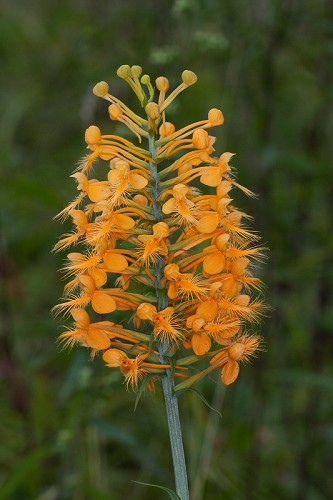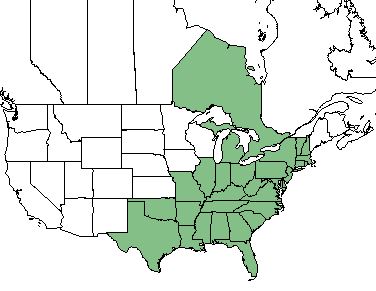Difference between revisions of "Platanthera ciliaris"
(→Conservation and Management) |
(→Conservation and Management) |
||
| Line 41: | Line 41: | ||
==Conservation and Management== | ==Conservation and Management== | ||
| − | Due to habitat loss, harvesting, and land management practices such as fire suppression, there has been a decrease in ''P. ciliaris''. It has been listed as threatened in Connecticut, Florida, Maryland, Michigan, Ohio, and Pennsylvania. It is also listed as endangered in Illinois, Indiana, new York, and Rhode Island. | + | Due to habitat loss, harvesting, and land management practices such as fire suppression, there has been a decrease in ''P. ciliaris''. It has been listed as threatened in Connecticut, Florida, Maryland, Michigan, Ohio, and Pennsylvania. It is also listed as endangered in Illinois, Indiana, new York, and Rhode Island. Canada is considered to be locally extinct. <ref name= "USDA"> [https://plants.usda.gov/core/profile?symbol=CEAM USDA Plant Database]</ref> |
==Cultivation and restoration== | ==Cultivation and restoration== | ||
Revision as of 19:20, 24 May 2018
| Platanthera ciliaris | |
|---|---|

| |
| Photo by John Gwaltney hosted at Southeastern Flora.com | |
| Scientific classification | |
| Kingdom: | Plantae |
| Division: | Magnoliophyta - Flowering plants |
| Class: | Magnoliopsida - Dicots |
| Order: | Orchidales |
| Family: | Orchidaceae |
| Genus: | Platanthera |
| Species: | P. ciliaris |
| Binomial name | |
| Platanthera ciliaris (L.) Lindley | |

| |
| Natural range of Platanthera ciliaris from USDA NRCS Plants Database. | |
Contents
Taxonomic Notes
Synonyms: Habenaria ciliaris (Linnaeus), Blephariglottis ciliaris (Linneaus)
Variety: none
Description
P. ciliaris is a perennial forb/herb of the Orchidaceae family that is native to North America. [1]
Distribution
P. ciliaris is native to the eastern United States, reaching as far west as Texas, as well as Ontario, Canada. [1]
Ecology
Habitat
Phenology
Flowers are known to bloom between July and September. [2]
Conservation and Management
Due to habitat loss, harvesting, and land management practices such as fire suppression, there has been a decrease in P. ciliaris. It has been listed as threatened in Connecticut, Florida, Maryland, Michigan, Ohio, and Pennsylvania. It is also listed as endangered in Illinois, Indiana, new York, and Rhode Island. Canada is considered to be locally extinct. [1]